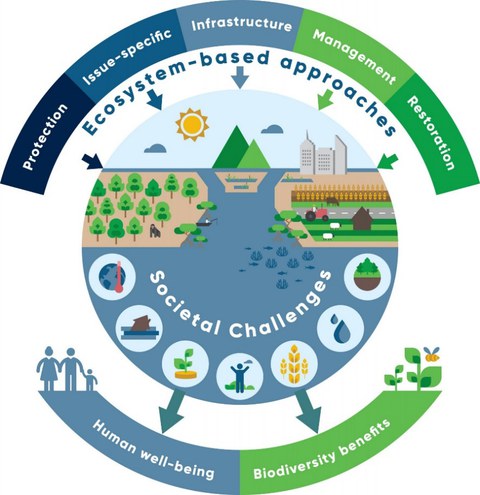84th UNEP/UNESCO/BMUV International Short Course - Urban Nature-Based Solutions (SC84)
Duration: 01 - 19 August 2022 (online)
Motivation
Sustainable urban development is decisive for sustainable global development. As cities grow and change, so do the demands on social infrastructure, economic systems and natural resources. It is essential that we fundamentally reorient the patterns of daily life, our built environment and the natural systems in and around cities worldwide. The success and pace of urban transformation will determine whether we meet the goals set out in the global 2030 Agenda for Sustainable Development.

Ecosystem-based approaches (IUCN, 2020)
Nature must be at the heart of our cities: the places we work, play and engage. The UNEA-5 ‘Resolution on Nature-based Solutions for Supporting Sustainable Development’ defines Nature-based Solutions (NbS) as “actions to protect, conserve, restore, sustainably use and manage natural or modified terrestrial, freshwater, coastal and marine ecosystems, which address social, economic and environmental challenges effectively and adaptively, while simultaneously providing human well-being, ecosystem services and resilience and biodiversity benefits.’’ Particularly, urban nature-based solutions address multiple challenges, including climate change and loss of biodiversity, disaster risk, water and food security, human health and socio-economic development. The impacts of climate change pose unique risks to densely populated urban areas. As the share of the global population living in urban areas continues to rise, the role of nature-based solutions as part of climate adaptation strategies in urban settings is an urgent priority.
Course concept and objectives
This course offers a unique opportunity to discuss how nature-based solutions can help tackle many different environmental risks in urban territories (e.g. from extreme heat to floods) while offering additional benefits for health, well-being and urban economies. The course will explore critical topics such as:
- The path towards resilient and sustainable cities
- Urban ecosystems and sustainability
- Planetary Boundaries
- Urban risks and impacts of global climate
- Sendai Framework for Disaster Risk Reduction and the synergies with climate action
- The concept of NbS
- Cities 2030: Implementing the New Urban Agenda
- Theory of change and systemic change
- Nature-based Solutions in Urban Planning
- Policies Frameworks for implementing NbS in urban territories
- Ecosystem-based adaptation and climate justice
After completing the course, participants will be able to:
- Explain the concept of NbS and its value for sustainable development, 2030 Agenda and its SDGs,
- Identify and distinguish key elements of effective urban sustainability strategies,
- Apply NbS to a real-life policy-making context,
- Apply the NbS approach in the development and implementation of measures/strategies in urban areas, and
- Discuss the main challenges/opportunities for advancing NbS in the context of urban areas.
Participants will also develop a post-training action plan (PTAP) for a challenge in their field of work, applying the course contents and considering inspiration received from facilitators and fellows during the course. This plan shall be implemented autonomously upon return and facilitate the transfer of the newly acquired knowledge into the day-to-day activities.
Target groups
This course is aimed at experts and executives who prepare and implement political decisions and practical measures towards the goals of sustainable cities.
A first university degree (e.g. BA, BSc) in a related field is essential. Adequate communication skills in the English language and the nomination by the delegating institution are mandatory. CIPSEM Alumni are welcome and encouraged to apply for this short course.
What makes participating in this online course transformative?
- Experience of the CIPSEM team in conducting engaging, meaningful online trainings considering the challenges in developing countries and emerging economies
- A part-time, 3-week learning experience combining live video-conference sessions, self-study units and exchange on our online learning platform
- Renowned international and German facilitators
- Financial support towards good internet access and living costs (200 €)
- Participants become part of a large international network of environmental experts and leaders (more than 2 500 alumni from 145 countries)
- Transfer of the gained knowledge and skills through mentored development of post-training action plans
- Alumni of this course can apply for one of several innovation fellowships supporting the implementation of the post-training action plan with 2000 €
Application and participation
Qualified professionals are welcome to apply for this training from 8 March until 27 April 2022 on CIPSEM’s online application portal. The Steering Committee selects 22 participants of this course by July 2022. Only selected participants will be informed via email. Successful participants are awarded a Certificate of Proficiency in Urban Nature-based Solutions.
| Name | Institution |
|---|---|
| Dr. Erxleben, Friederike | German Environment Agency |
| Dr. Gajjar, Sumetee | PlanAdapt Berlin |
| Dr. Gallo, Patrícia | TU Dresden, Fakultät Umweltwissenschaften, Centre for International Postgraduate Studies of Environmental Management (CIPSEM) |
| Martinelli, Fernanda | Center for Development Research (ZEF), Department of Ecology and Natural Resources Management |
| Prof. Dr. Dr. h.c. Müller, Bernhard | TU Dresden, Faculty of Environmental Sciences, Senior Professorship Prof. Dr. Dr. h.c. Bernhard Müller |
| Polgár, Ana | PlanAdapt Berlin |
| Dr. Schiappacasse, Paulina | TU Dresden, Faculty of Environmental Sciences, Senior Professorship Prof. Dr. Dr. h.c. Bernhard Müller |
| Dr. Stenchly, Kathrin | University of Kassel, Competence Centre for Climate Change Mitigation and Adaptation (CliMA ) |
| Prof. Dr. Tan, Puay Yok | National University of Singapore, College of Design and Engineering, Department of Architecture |
| Dr. Vidal, Mariana | BluoVerda Germany (registered association) |

